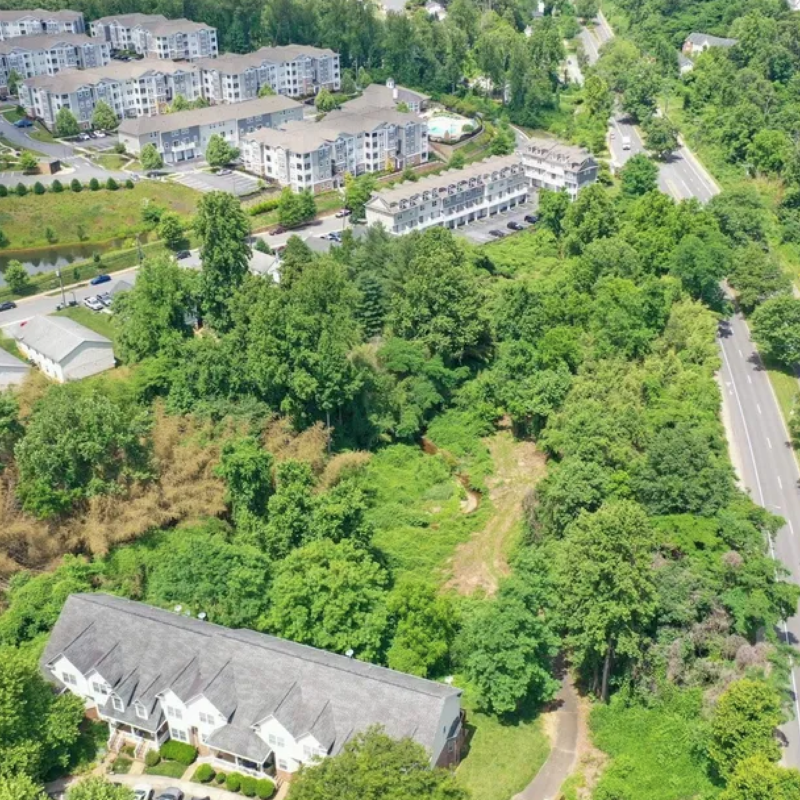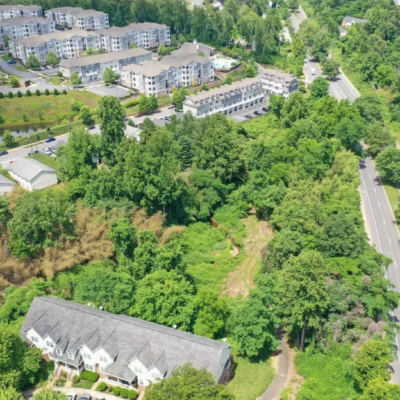Bordered by Route 20 to its east and Darden Towe Park to its south, a 77-acre parcel owned by Clara Belle Wheeler is largely wooded except for the grandiose 1862 house she lives in and a few adjoining buildings. Down a rise and located in a small cow pasture is a log house—the reconstructed site of the birthplace of Revolutionary War hero George Rogers Clark.
Her parcel is also located in the northernmost corner of the Pantops growth area and that, combined with the incredible scenic and historic value, led Wheeler to first consider requesting a change to rural area classification when she inherited the land in 2000.
Wheeler reached out to her Albemarle Board of Supervisors representative, Ken Boyd, and attended various meetings. In time, her desire became common knowledge among some county officials. Consequently, when the Board pledged in a May 2006 Resolution of Intent to move another landowner’s parcel from Rural to Development, it seemed only natural to take out Wheeler’s 77 acres to lessen the impact of the former move.

County staff and supervisors are debating whether Clara Belle Wheeler’s 77 acres should stay in the growth area or not.
|
Shortly thereafter, county staff recommended to reclassify Wheeler’s land as rural, and the change seemed inevitable until earlier this year when Wheeler for the first time discovered, in a C-VILLE article on the other property’s reclassification, that her land was under review. Upset, Wheeler raised such hackles that Boyd arranged for and accompanied her to a meeting with county staff late this spring.
“When we left [the meeting], I thought at that point she was still thinking about what she wanted to do,” Boyd says. Wheeler quickly made up her mind, appearing at a June 5 Planning Commission meeting to request her parcel remain in the Development Area.
Without a compelling reason to defy the landowner’s wishes, the Commission granted Wheeler’s request. After months of consternation, “I thought it was completely over,” Wheeler says.
But Wheeler found that wasn’t the case when she attended a September 12 Supervisors’ meeting. David Slutzky questioned whether it would make sense to reclassify her land anyway, based upon staff’s earlier recommendation.
“I was flabbergasted that they were bringing up my property,” Wheeler says. Nevertheless, staff was asked to return with a new proposal concerning her property.
The request creates a conundrum for the Board, a conundrum most succinctly spelled out by Slutzky at that September meeting: “We’re weighing the individual property owner’s wishes appropriately, but we should be weighing them against ultimately what’s the objective of this master planning process.”
At that same meeting, Wheeler offered her own view: “To propose a change in property rights or the land use for my property without contacting me is unconscionable,” she said during the public comment. “The property rights for the people who live in that area should be the concern of the people who live on that land.”
Following her plea, Supervisor Dennis Rooker observed, “There is no property right in a comprehensive plan designation,” he says. “If a designation changes for a property it does not change its zoning. It’s a change in how the property fits into the community’s long-term plan.”
Other county officials, however, take issue with this argument. “I think that it changes the value of the land,” says Marcia Joseph, Planning Commission chair. “Putting it in the growth area gives it more value because there’s more potential.”
“It doesn’t change the zoning, [Rooker]’s right,” Boyd says. “You still have to request a change in zoning, but where property ends up in the comprehensive plan is still very important.”
Boyd’s comments reveal a potential divide when the Supervisors reconvene on this issue, likely in November. “I’m inclined to lean on the side of the property owner unless there’s a compelling reason,” says Boyd. “All along I’ve wanted to do what Clara Belle wants.”
C-VILLE welcomes news tips from readers. Send them to news@c-ville.com.




